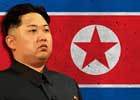 The fierce nuclear showdown between the Democratic People’s Republic of Korea and the United States of America is coming to an end in front of the eyes of the world.
The fierce nuclear showdown between the Democratic People’s Republic of Korea and the United States of America is coming to an end in front of the eyes of the world.
The US has been driven into a tight corner by a series of measures the DPRK has adopted according to its own nuclear programme since the outset of last year–its first H-bomb test, the test-firing of the ground-to-ground intermediate-range strategic ballistic rocket Hwasong 10 and the underwater launch test of ballistic missile from a strategic submarine in January, June and August 2016, respectively; and the test-firing of the ground-to-ground intermediate-range strategic ballistic missile Pukguksong 2, the ground-to-ground intermediate-range strategic ballistic rocket Hwasong 12 and the ICBM Hwasong 14 in February, May and July 2017,
respectively. The successful test-firing of the ICBM, the last gateway to perfecting the country’s national nuclear forces, on Independence Day of the US was a direct blow to the “sole superpower in the world.” The second test-firing of Hwasong 14 aimed at the whole of the US mainland augurs ill for the American empire. These successive measures have caught the nuclear superpower off guard.
From an objective point of view the outcome of the DPRK-US nuclear showdown seems certain.
The DPRK has placed the Trump administration on the defensive; the latter has clung to the policy of nuclear blackmail against the former, instead of drawing a serious lesson from the preceding administrations’ strategic failure. This hostile policy has convinced the DPRK that the US is steadfast in its aggressive ambition, thereby compelling it to maintain its strategic line of carrying on the economic construction and the upbuilding of the nuclear forces simultaneously.
The DPRK neither wavered nor flinched in the face of hardships. Now that the country possesses ICBMs, the Trump administration finds it hard to come up with any alternative to justify its war policy.
A Russian newspaper commented: Trump has driven himself into a political stalemate. Now he cannot help admitting that he is the loser. Those who are willing to resolve the Korean peninsula issue should admit that the DPRK is a nuclear and missile power. The same is true of the US as it is chiefly responsible for this issue.
Joseph Dunford, chairman of the US Joint Chiefs of Staff, said: If a war breaks out on the Korean peninsula, north Korea can take the initiative and a heavy death toll is inevitable.
The US has turned out to be the loser in the duel of courage and wisdom. No other country but the DPRK has declared that it will challenge the “nuclear superpower” head-on. This boldness implies that it has made full preparations in terms of military techniques.
A Hong Kong newspaper described this ICBM test-firing as the DPRK’s meaningful action to demonstrate its capability of striking the US mainland and a grave warning against the US.
It continued to comment: the US faces greater anxiety. The DPRK is at ease as it has already mastered the technologies concerning nuclear weapons and ICBM. To be sure, America must be feeling nervous. After the successful launch of its ICBMs the international society sees the DPRK in a new perspective. Witnessing these developments, anyone can predict who will be the winner and who will be the loser. It is certain that the DPRK will win.


